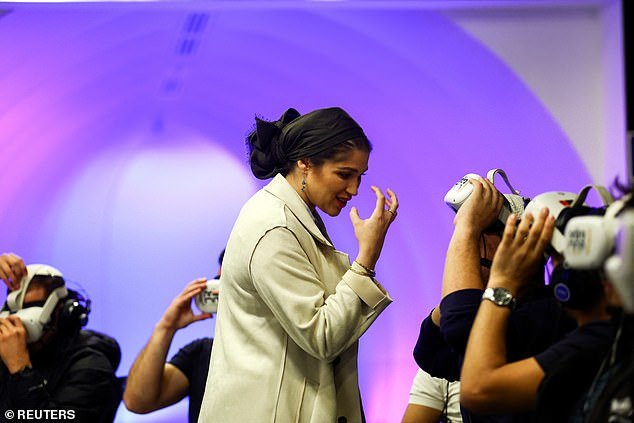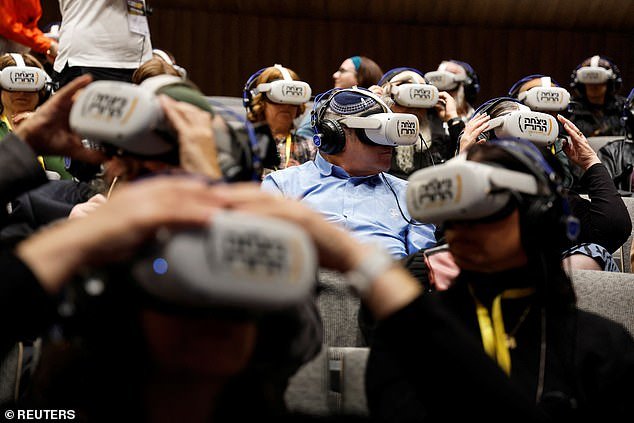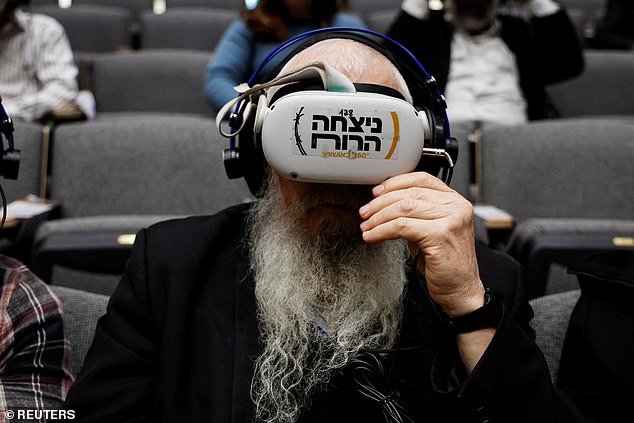Holocaust survivor cries during virtual reality experience of Auschwitz deathcamp
>
A holocaust survivor cried as he relived the horrors of the Auschwitz death camp through virtual reality for the first time.
Menachem Haberman, 95, was sent to Auschwitz in 1944 on a cattle train, and recently took part in a group viewing of ‘The Triumph of the Spirit’, a VR film providing an immersive experience of the death camp.
‘I felt like I returned to that same period from the start,’ Menachem said. ‘I saw all these things, and I was reminded of some things that to this day I can’t forget.’
The film’s co-creator, Miriam Cohen, 30, said she made ‘The Triumph of the Spirit’ to ‘bring this experience, which can be so powerful and profound, to all those who cannot go and to as many people as possible.’
Holocaust survivor Menachem Haberman, 95, participates in a virtual guided tour of the former Nazi concentration camp Auschwitz-Birkenau, where he was deported to in 1944

Miriam Cohen, the creative director and co-founder of Triumph of the Spirit, gestures to a participant during a virtual guided tour of the former concentration camp Auschwitz-Birkenau
More than 1,100,000 people were killed at Auschwitz, a concentration camp and later extermination camp in Poland used by the Nazis in World War II.
Auschwitz today is a memorial and museum, open to the public.
Today, two million visit each year to learn about the systematic killing of Jews, Poles, Romani and other groups.
When the Hungarians annexed his hometown of Munkács on 10 November 1938, the Jews of the town reportedly ‘blessed the return of Hungarian rule‘.
However, the Jewish communities were persecuted, beaten and robbed, and forced into labour. Menachem Haberman’s father was sent to the eastern front.
In 1944, Menachem and 20 family members were sent to live in a two-bedroom flat in the Munkács ghetto.
They were deported to the Auschwitz-Birkenau death camp months later, where he became separated from his family.
Menachem’s mother and five siblings were sent to gas chambers, while his sister died of illness, leaving him as the last member of his family.
He was sent on a death march in January 1945 where many of his friends died. Survivors were sent to Buchenwald concentration camp in Weimar, Germany.
Insufficient food, poor conditions and executions took the lives of 56,545 of the 280,000 prisoners it housed.
During the virtual reality experience, Menachem said he recalled an area where medical experiments were conducted on prisoners and a wall in front of which people were shot.
He cried as he removed the virtual reality goggles.

A group participates in a virtual guided tour of the former Nazi German concentration camp Auschwitz-Birkenau and Polish Jewry before the Holocaust by using Virtual Reality headsets

A man participates in a virtual guided tour of the former Nazi German concentration camp
David Bitton, a 16-year-old Jewish seminary student, watched the film in Jerusalem.
He said: ‘When you watch it, it’s like a nightmare that you don’t want to be in.’
A poll in 2019 found 5% of UK adults do not believe the Holocaust took place.
45% did not know how many had been killed, and one in 12 believed the true figure of six million had been exaggerated.
Much has been written to discredit misinformation surrounding the Holocaust.
A report by the World Zionist Organization ahead of Friday’s International Holocaust Remembrance Day describes a rise in global anti-Semitism after the COVID-19 pandemic created a ‘new reality’ as activity diverted to social networks.
The three film-makers behind the project hope that technologies like VR will have a positive impact. They are offering the experience to groups who can book a screening and individual users can watch the film at a mall in Jerusalem.
Viewers get a guided tour of Jewish life in Poland before the Holocaust, visit the Nazi extermination camp and then a tour of Israel while hearing survivor stories.
The VR tour will premiere in the United Kingdom next week at an event attended by members of the House of Lords.
